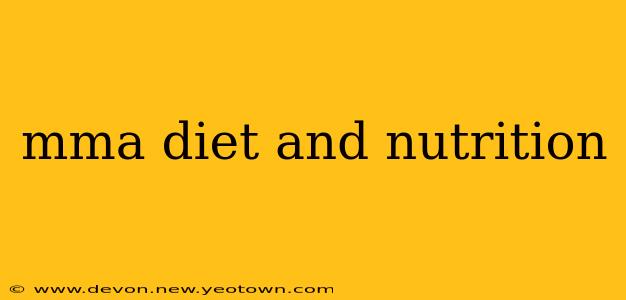The roar of the crowd, the sweat stinging your eyes, the adrenaline coursing through your veins – mixed martial arts (MMA) is a brutal, beautiful sport demanding peak physical and mental performance. But behind every knockout punch and lightning-fast takedown lies a meticulously crafted nutrition plan. This isn't just about eating; it's about fueling your body like a high-performance machine, ready to withstand the rigors of intense training and explosive competition. Let's dive into the world of MMA diet and nutrition, exploring the strategies that will help you reach your full potential.
What are the best foods for MMA fighters?
This isn't about restrictive diets; it's about strategic fueling. Think of your body as a finely tuned engine. To perform optimally, it needs the right kind of fuel – a balanced diet rich in lean protein, complex carbohydrates, and healthy fats. Imagine a typical day: you'll start with oatmeal with berries for sustained energy, followed by a lean protein source like chicken breast with brown rice and vegetables for lunch. Dinner might include salmon with quinoa and broccoli, providing essential omega-3 fatty acids and fiber. Throughout the day, you'll supplement with snacks like Greek yogurt, nuts, or fruit to maintain energy levels and prevent muscle breakdown. The focus is on whole, unprocessed foods that provide sustained energy and support muscle growth and repair.
What is the best diet for cutting weight in MMA?
Weight cutting is a controversial but often necessary aspect of MMA. The goal is to shed weight to compete in a lower weight class, gaining a competitive advantage. However, it's crucial to do this safely and strategically. Crash dieting is dangerous and can severely impair performance. Instead, a gradual and controlled approach is essential, focusing on a calorie deficit achieved through a combination of dietary changes and increased exercise. This often involves reducing carbohydrate intake while maintaining sufficient protein for muscle preservation. Hydration is also paramount; proper fluid intake is essential to maintain health and prevent dehydration during the weight cut. Remember, consulting a registered dietitian or sports nutritionist experienced in MMA weight management is crucial to ensure a safe and effective weight-cutting strategy.
What should I eat before and after an MMA workout?
Timing your nutrition around your training is vital. Before a workout, you'll need easily digestible carbohydrates for immediate energy. A banana with some peanut butter or a small bowl of oatmeal is perfect. Post-workout, your body needs protein and carbohydrates to repair and rebuild muscle tissue and replenish glycogen stores. A protein shake with added carbohydrates or a chicken salad sandwich on whole-wheat bread are excellent options. The specific timing and composition of your pre- and post-workout meals will depend on the intensity and duration of your training session.
What supplements should an MMA fighter take?
While a balanced diet should provide most of your nutritional needs, some supplements can be beneficial. Protein powder can help meet increased protein requirements, creatine can enhance strength and power, and omega-3 fatty acids can reduce inflammation. However, it's essential to choose high-quality supplements from reputable brands and consult with a healthcare professional or registered dietitian before incorporating any supplements into your routine. Remember, supplements are supplemental; they shouldn't replace a healthy diet.
What are the common mistakes people make when following an MMA diet?
One common mistake is neglecting proper hydration. Water is essential for nearly every bodily function, especially during intense training. Another mistake is overly restricting calories, leading to fatigue, muscle loss, and impaired performance. Ignoring the importance of micronutrients (vitamins and minerals) is also a frequent error. These nutrients are crucial for numerous bodily functions, including immune function and energy production. Finally, many fighters fail to personalize their nutrition plan. A one-size-fits-all approach doesn't work; your diet should be tailored to your individual needs, training schedule, and body composition goals.
Conclusion: The Power of Personalized Nutrition
The MMA diet isn't just a diet; it's a comprehensive strategy for optimizing your physical and mental performance. It's about understanding your body's needs, fueling it appropriately, and adapting your plan as you progress. Remember, consulting with a registered dietitian or sports nutritionist specializing in MMA is invaluable. They can help you create a personalized plan that aligns with your specific goals, training regimen, and individual requirements, ensuring you're always fighting at your best. This is your journey to peak performance; fuel it wisely!

